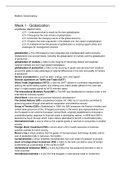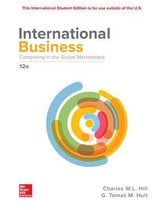Midterm Samenvatting
Week 1 - Globalization
LEARNING OBJECTIVES:
- LO1-1 Understand what is meant by the term globalization.
- LO1-2 Recognize the main drivers of globalization.
- LO1-3 Describe the changing nature of the global economy.
- LO1-4 Explain the main arguments in the debate over the impact of globalization.
- LO1-5 Understand how the process of globalization is creating opportunities and
challenges for management practice.
globalization = The shift toward a more integrated and interdependent world economy.
Globalization has several facets, including the globalization of markets and the globalization
of production
globalization of markets = refers to the merging of historically distinct and separate
national markets into one huge global marketplace.
globalization of production = refers to the sourcing of goods and services from locations
around the globe to take advantage of national differences in the cost and quality of Factors
of production
factors of production = (such as labor, energy, land, and capital)
General Agreement on Tariffs and Trade (GATT)
World Trade Organization (WTO) = (like the GATT before it) is primarily responsible for
policing the world trading system and making sure nation-states adhere to the rules laid
down in trade treaties signed by WTO member states
The International Monetary Fund (IMF) = The IMF was established to maintain order in the
international monetary system
World Bank = was set up to promote economic development
The United Nations (UN) = established October 24, 1945, by 51 countries committed to
preserving peace through international cooperation and collective security
Group of Twenty (G20) = Established in 1999, the G20 comprises the finance ministers and
central bank governors of the 19 largest economies in the world, plus representatives from
the European Union and the European Central Bank, originally established to formulate a
coordinated policy response to financial crises in developing nations, in 2008 and 2009 it
became the forum through which major nations attempted to launch a coordinated policy
International trade = occurs when a firm exports goods or services to consumers in another
country
Foreign direct investment (FDI) = occurs when a firm invests resources in business
activities outside its home country.
Moore’s law = which predicts that the power of microprocessor technology doubles and its
cost of production falls in half every 18 months)
containerization = which simplifies transshipment from one mode of transport to another.
stock of foreign direct investment (FDI) = refers to the total cumulative value of foreign
investments as a percentage of the country’s GDP.
multinational enterprise (MNE) = is any business that has productive activities in two or
more countries.
International business = is any firm that engages in international trade or investment.
, - LO1-1 Understand what is meant by the term globalization.
globalization of markets = refers to the merging of historically distinct and separate
national markets into one huge global marketplace.
We are moving toward a world in which barriers to cross-border trade and investment
are declining; perceived distance is shrinking due to advances in transportation and
telecommunications technology; material culture is starting to look similar the world over;
and national economies are merging into an interdependent, integrated global economic
system. The process by which this transformation is occurring is commonly referred to as
globalization.
In many cases, it goes even beyond the company to the personal relationships a
customer has developed with a representative of a company—here we focus on what has
become known as CRM (customer relationship management).
For businesses, the globalization process has produced many opportunities. Firms
can expand their revenues by selling around the world and/or reduce their costs by
producing in nations where key inputs, including labor, are cheap. The global expansion of
enterprises has been facilitated by generally favorable political and economic trends.
workers in service industries felt more secure. Now, this too is changing. Advances in
technology, lower transportation costs, and the rise of skilled workers in developing countries
imply that many services no longer need to be performed where they are delivered.
- Understand what is meant by the term globalization. ?
globalization = The shift toward a more integrated and interdependent world economy.
Globalization has several facets, including the globalization of markets and the globalization
of production
Falling barriers to cross-border trade and investment have made it easier to sell
internationally. It has been argued for some time that the tastes and preferences of
consumers in different nations are beginning to converge on some global norm, thereby
helping create a global market.
significant differences still exist among national markets along many relevant
dimensions, including:
- consumer tastes and preferences
- distribution channels
- culturally embedded value systems
- business systems
- legal regulations.
The most global of markets are not typically markets for consumer products—where national
differences in tastes and preferences can still be important enough to act as a brake on
,globalization—but markets for industrial goods and materials that serve universal needs the
world over.
. If a firm moves into a nation not currently served by its rivals, many of those rivals are sure
to follow to prevent their competitor from gaining an advantage.
greater uniformity replaces diversity. In an increasing number of industries,—creating some
homogeneity across markets.
THE GLOBALIZATION OF PRODUCTION
globalization of production = refers to the sourcing of goods and services from locations
around the globe to take advantage of national differences in the cost and quality of Factors
of production
factors of production = (such as labor, energy, land, and capital)
By doing this, companies hope to lower their overall cost structure or improve the quality or
functionality of their product offering, thereby allowing them to compete more effectively.
Early outsourcing efforts were primarily confined to manufacturing activities . Increasingly,
however, companies are taking advantage of modern communications technology,
particularly the Internet, to outsource service activities to low-cost producers in other nations
The economist Robert Reich has argued that as a consequence. according to Reich, the
outsourcing of productive activities to different suppliers results in the creation of products
that are global in nature, that is, “global products.”
substantial impediments still make it difficult for firms to achieve the optimal dispersion of
their productive activities to locations around the globe. These impediments include:
- formal and informal barriers to trade between countries
- barriers to foreign direct investment
- transportation costs
- issues associated with economic and political risk
- the sheer managerial challenge of coordinating a globally dispersed supply chain
The Emergence of Global Institutions
Institutions are needed to help:
- manage
- regulate
- police the global marketplace
- to promote the establishment of multinational treaties to govern the global business
system
Including the
- General Agreement on Tariffs and Trade (GATT)
- its successor, the World Trade Organization;
- the International Monetary Fund and its sister institution, the World Bank;
- and the United Nations
, World Trade Organization (WTO) = (like the GATT before it) is primarily responsible for
policing the world trading system and making sure nation-states adhere to the rules laid
down in trade treaties signed by WTO member states.
The WTO is also responsible for facilitating the establishment of additional multinational
agreements among WTO member states. Over its entire history, and that of the GATT
before it, the WTO has promoted the lowering of barriers to cross-border trade and
investment.
The International Monetary Fund (IMF) = The IMF was established to maintain order in the
international monetary system. The IMF is often seen as the lender of last resort to nation-
states whose economies are in turmoil and whose currencies are losing value against those
of other nations.
World Bank = was set up to promote economic development. It has focused on making low-
interest loans to cash-strapped governments in poor nations that wish to undertake
significant infrastructure investments (such as building dams or roads).
both created in 1944
The United Nations (UN) = established October 24, 1945, by 51 countries committed to
preserving peace through international cooperation and collective security
the UN has four purposes:
- to maintain international peace and security
- to develop friendly relations among nations
- to cooperate in solving international problems and in promoting respect for human
rights
- and to be a center for harmonizing the actions of nations
Although the UN is perhaps best known for its peacekeeping role, one of the organization’s
central mandates is the promotion of higher standards of living, full employment, and
conditions of economic and social progress and development—all issues that are central to
the creation of a vibrant global economy
Group of Twenty (G20) = Established in 1999, the G20 comprises the finance ministers and
central bank governors of the 19 largest economies in the world, plus representatives from
the European Union and the European Central Bank, originally established to formulate a
coordinated policy response to financial crises in developing nations
in 2008 and 2009 it became the forum through which major nations attempted to launch a
coordinated policy
Drivers of Globalization
Two macro factors underlie the trend toward greater globalization.
1. The first is the decline in barriers to the free flow of goods, services, and capital that
has occurred in recent decades.





